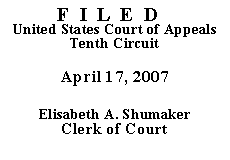

| UNITED STATES OF AMERICA, |
|
| v. | |
| WILLIAM DEAN DAVIS, |
(D.C. Nos. 06-CV-1147-LTB and 03-CR-11-LTB) |
Background
On April 11, 2003, Mr. Davis pleaded guilty to possession of methamphetamine with intent to distribute in violation of 21 U.S.C. § 841(a)(1) and (b)(1)(viii) and to possession of a firearm during commission of drug trafficking in violation of 18 U.S.C. § 924(c)(1)(A). His conviction became final on July 9, 2003. His brother and co-defendant, Don Wayne Davis, did not plead guilty, but instead challenged the admission of the evidence obtained in the search. In March 2006, the United States District Court for the District of Colorado found that the warrant authorizing law enforcement to search the Davis's home was invalid and excluded the evidence obtained in the search. As a result, the government dropped the charges against Don.
On June 15, 2006, not quite three years after his conviction became final, Mr. Davis filed a petition under 28 U.S.C. § 2255 raising two claims. He contended that law enforcement violated his constitutional right against unreasonable searches and seizures and that he received ineffective assistance of counsel. The district court dismissed his petition as untimely because it was not filed within the AEDPA one-year statute of limitations. The court also held that Mr. Davis was not entitled to equitable tolling.Discussion
A habeas petitioner may appeal the denial of his § 2255 motion only if the district court or this Court first issues a COA. 28 U.S.C. § 2253(c)(1)(B). A COA will issue "only if the applicant has made a substantial showing of the denial of a constitutional right." 28 U.S.C. § 2253(c)(2). To make such a showing, a petitioner must demonstrate that "reasonable jurists could debate whether . . . the petition should have been resolved in a different manner or that the issues presented were adequate to deserve encouragement to proceed further." Slack v. McDaniel, 529 U.S. 473, 483-84 (2000) (internal quotation marks omitted). We find no room to debate here.
AEDPA requires a federal prisoner to file for federal habeas relief within one year after his conviction becomes final or within one year after "the facts supporting the claim or claims presented could have been discovered through the exercise of due diligence." 28 U.S.C. § 2255(4). Though the one-year statute of limitations may be subject to equitable tolling, such relief "is only available when an inmate diligently pursues his claims and demonstrates that the failure to timely file was caused by extraordinary circumstances beyond his control." Marsh v. Soares, 223 F.3d 1217, 1220 (10th Cir. 2000).
The facts supporting Mr. Davis's claims of an unconstitutional search and ineffective assistance of counsel could have been discovered through the exercise of due diligence at any time after his conviction became final. Mr. Davis argues that ignorance of the filing deadline prevented him from filing his petition earlier. However, "ignorance of the law, even for an incarcerated pro se petitioner, generally does not excuse prompt filing." Id. at 1220 (internal quotations omitted). He also argues that because the court mailed him the requisite forms to fill out his § 2255 petition, it effectively gave him permission to file such a petition regardless of AEDPA constraints. He cites no authority to support this proposition. Merely providing a petitioner with court forms does not grant permission for late filing of a habeas petition. Reasonable jurists would agree that the AEDPA one-year filing deadline forecloses Mr. Davis's habeas corpus petition.Conclusion
Accordingly, we DENY Mr. Davis's request for a COA and DISMISS this appeal. Appellant's motion to proceed in forma pauperis is also DENIED.
Entered for the Court,
Michael W. McConnell
Circuit Judge
*.This order is not binding precedent, except under the doctrines of law of the case, res judicata, and collateral estoppel.